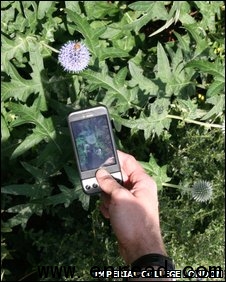Mobile app sees science go global 手机程序将科学全球化
(单词翻译:单击)
A mobile phone application will help professional and "citizen" scientists collect and analyse data from "in the field", anywhere in the world.
一个手机程序将会帮助世界上任何地方的专业或“市民”科学家收集、分析“专业领域”的数据。

The approach allows "citizen scientists" worldwide to contribute
The EpiCollect software collates1 data from certain mobiles - on topics such as disease spread or the occurrence of rare species - in a web-based database.
The data is statistically2 analysed and plotted(标绘的) on maps that are instantly available to those same phones.
The approach is outlined in the open-access journal PLoS ONE.
The software has been developed for so-called smartphones that run Google's Android open-source operating system.
Researchers can report back to the EpiCollect database with results from experiments they do in the field, and "citizen scientists" can send back photos or videos of certain species from their own backyards.
The phones' GPS system automatically logs users' locations, and the data is then plotted by location using Google Maps. Then anyone can access the database online, or from their phone.
Real-time results
There have been many research projects in the past that make use of phones' instant access and GPS functionality.
However, lead researcher on the project David Aanensen of Imperial College London said that the full integration3(整合,集成) into a central and widely-accessible database makes EpiCollect particularly useful.
"Many of the other tools that allow one to send data by mobile phone don't have an easy way for any of the researchers to look at any of the data in almost real-time," he told BBC News.
The team is already working to track the occurrence of chytridiomycosis, a fungal(真菌的) infection that is decimating(十中抽一) the numbers of amphibians4(两栖类) around the globe.
"We're investigating the use of the phones for the project; rather than researchers taking a GPS out into the field and recording5 their results on paper, we can get all of this data much more quickly - and it limits the amount of equipment they have to take out into the field," Mr Aanensen said.
He added that there is particular potential for using the approach with school projects. He cited the classic "quadrant(象限)" experiment in biology, in which schoolchildren set out a fixed6 area, for example in a park, and count the number of species in that area.
"If we have a database version, it allows them to compare between their school and another school or a set of schools in one country versus7 a set in another country, and the natural ability to use a phone rather than paper might be more attractive to school kids."
The team is now working to develop an iPhone-compatible version of the application. They are also as well as a website that, based on a given project's aims, automatically sets up a database and writes the computer code to be uploaded to phones.
"People who don't have experience setting up databases and setting up websites with maps will be able to come along and have their own project database and phone software provided," Mr Aanensen said.
"We want to just sit back and see the kind of exciting projects that people will be using this for."
 收听单词发音
收听单词发音
1
collates

|
|
| v.校对( collate的第三人称单数 );整理;核对;整理(文件或书等) | |
参考例句: |
|
|
|
2
statistically

|
|
| ad.根据统计数据来看,从统计学的观点来看 | |
参考例句: |
|
|
|
3
integration

|
|
| n.一体化,联合,结合 | |
参考例句: |
|
|
|
4
amphibians

|
|
| 两栖动物( amphibian的名词复数 ); 水陆两用车; 水旱两生植物; 水陆两用飞行器 | |
参考例句: |
|
|
|
5
recording

|
|
| n.录音,记录 | |
参考例句: |
|
|
|
6
fixed

|
|
| adj.固定的,不变的,准备好的;(计算机)固定的 | |
参考例句: |
|
|
|
7
versus

|
|
| prep.以…为对手,对;与…相比之下 | |
参考例句: |
|
|
|




